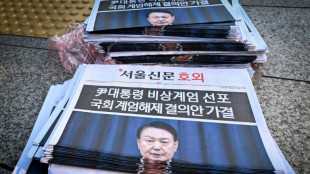
-
 Gunman held after failed attack on Sikh leader in India
Gunman held after failed attack on Sikh leader in India
-
Pakistan recall Babar Azam for South Africa tour, Sajid Khan out

-
 Seoul stocks sink amid S. Korea drama as Asian markets mixed
Seoul stocks sink amid S. Korea drama as Asian markets mixed
-
French appeals court to rule in Polanski defamation case

-
 Death toll rises to 29 in southern Thailand floods
Death toll rises to 29 in southern Thailand floods
-
South Korean opposition move to impeach president after martial law bid

-
 Trump's vows of quick peace fall flat on Ukraine frontlines
Trump's vows of quick peace fall flat on Ukraine frontlines
-
Soldiers vs office chairs: South Korea's martial law standoff

-
 Japan's Premier League pioneer Inamoto retires aged 45
Japan's Premier League pioneer Inamoto retires aged 45
-
Second major Myanmar rebel group calls for talks with junta

-
 FIFA to reveal Club World Cup draw amid apathy, legal threats
FIFA to reveal Club World Cup draw amid apathy, legal threats
-
Taiwan's Lai arrives in Tuvalu to shore up Pacific allies

-
 South Korean president pressed to step down over martial law bid
South Korean president pressed to step down over martial law bid
-
Huge Vietnam fraud case raises questions over banking system

-
 Ghana thrusts economy into limelight in tight race for president
Ghana thrusts economy into limelight in tight race for president
-
Philippines says China Coast Guard fired water cannon, 'sideswiped' govt vessel

-
 Vietnam pushes electric motorbikes as pollution becomes 'unbearable'
Vietnam pushes electric motorbikes as pollution becomes 'unbearable'
-
Seoul stocks sink amid S. Korea drama as Asian markets struggle

-
 Hong Kong mega development plan to devour villages, wetlands
Hong Kong mega development plan to devour villages, wetlands
-
French government risks falling in no-confidence vote

-
 Stokes fit as England name unchanged team for 2nd New Zealand Test
Stokes fit as England name unchanged team for 2nd New Zealand Test
-
Djokovic to begin bid for 25th Grand Slam crown in Brisbane

-
 Life has 'disappeared': Mexican city reeling from cartel infighting
Life has 'disappeared': Mexican city reeling from cartel infighting
-
IXOPAY and Aperia Compliance Merge to Extend Advanced Payment Data Security to Merchant Acquirers and Merchants of All Sizes, Worldwide

-
 S.Korea political upheaval shows global democracy's fragility - and resilience
S.Korea political upheaval shows global democracy's fragility - and resilience
-
Van Nistelrooy off to winning start at Leicester, Palace beat Ipswich

-
 Global stocks end mostly up with DAX crossing 20,000 for 1st time
Global stocks end mostly up with DAX crossing 20,000 for 1st time
-
Georgia's ombudsman accuses police of torturing pro-EU protesters

-
 Norway, Sweden win big to reach Women's Euro 2025
Norway, Sweden win big to reach Women's Euro 2025
-
Partner of ex-Abercrombie & Fitch CEO pleads not guilty to sex trafficking

-
 Leverkusen eliminate Bayern from German Cup after Neuer sees first red
Leverkusen eliminate Bayern from German Cup after Neuer sees first red
-
Syria rebels 'at gates' of central city Hama

-
 Amazon launches AI models to challenge rivals
Amazon launches AI models to challenge rivals
-
Bolivian ex-president, who fled to US, sentenced to six years prison

-
 Bayern's Neuer sent off for first time in 866-game career
Bayern's Neuer sent off for first time in 866-game career
-
Namibia elects its first woman president

-
 Scottish artist Jasleen Kaur wins 2024 Turner Prize
Scottish artist Jasleen Kaur wins 2024 Turner Prize
-
Barca hit five as they return to winning ways at Mallorca

-
 S. Korea president says will lift martial law
S. Korea president says will lift martial law
-
Olympic champion Evenepoel breaks hand, shoulder in postal van collision

-
 Syria rebels advance on central city
Syria rebels advance on central city
-
S. Korea's President Yoon, embattled conservative

-
 UK museum in talks with Greece over 'long-term' deal for Parthenon Marbles
UK museum in talks with Greece over 'long-term' deal for Parthenon Marbles
-
What we know about South Korea's martial law

-
 Biden announces $1 bn for Africa during maiden trip
Biden announces $1 bn for Africa during maiden trip
-
Retailers point to solid US sales over holiday weekend

-
 Europe-loving Blinken on last trip to NATO before Trump handover
Europe-loving Blinken on last trip to NATO before Trump handover
-
Seeking a new way of life under the sea - and a world record

-
 Defying headwinds, German stocks hit milestone
Defying headwinds, German stocks hit milestone
-
PGA Tour-LIV talks 'definitely moving' - Woods


Trump vows to defend US dollar hegemony, but is it under threat?
US President-elect Donald Trump has threatened retaliation against governments that challenge the US dollar, vowing "100 percent tariffs" on countries that undercut the US currency.
The Republican vowed the action on states that "create a new BRICS Currency" or otherwise "replace the mighty US dollar," according to a post on Truth Social on Monday.
BRICS refers to a grouping that includes Brazil, Russia, India, China and South Africa, and has expanded in recent years to include Iran, Egypt, Ethiopia and the United Arab Emirates.
Trump's statement, however, comes at a time when the greenback's hegemony does not appear to be facing an immediate threat, having been the world's reserve currency for decades.
- Is the dollar's influence diminishing? -
The US dollar currently comprises 58 percent of foreign exchange reserves held worldwide, according to the International Monetary Fund (IMF), down from 67 percent in 2000.
But the greenback accounts for 74 percent of export invoices in the Asia-Pacific region, which is the most active in terms of international trade, the IMF says.
The dollar has maintained its unique position globally since the 1944 Bretton Woods accords, the international agreement that established the IMF and required signatories to peg their currencies to the US currency.
The system has evolved since that time and several countries have stopped indexing their currencies to the dollar, but without challenging its status as the global reserve currency.
The United States' massive role in monetary policy also reflects the country's position as the world's largest consumer of goods and services and the source of more than $8 trillion in government debt held by foreign investors.
The dominance of the US currency has not been affected by the huge scale of its debt, nor by the shakiness of its financial system during the 2008 global financial crisis.
"The US dollar remains as dominant as ever as a global funding currency, a payment currency for international transactions, and a reserve currency," said Eswar Prasad, a professor of international trade policy at Cornell University in New York state.
"Without the dollar as the dominant international currency, the multilateral trading system would effectively cease to exist –- making the global economy much less efficient," said Benn Steil, a senior fellow at the US-based Council on Foreign Relations.
- Is the dollar being threatened? -
Trump's comments came on the heels of a BRICS summit in October in Kazan, Russia, where members discussed boosting non-dollar transactions and strengthening local currencies.
"The BRICS today might be where Europe was in the 1970s and that's optimistic in terms of integrating," said Adam Button, chief currency analyst at ForexLive.
Recent years have seen an uptick in transactions involving local currencies, especially between China and Russia, in light of international sanctions on Moscow following its invasion of Ukraine in 2022.
There has not, however, been an official effort to employ a currency throughout the group, or at forming an official monetary union.
"I don't know if there (are) any of those countries (that) would give up monetary sovereignty," Button said. "So it's a wholly fringe idea, and I'm not even sure why Trump decided to validate it."
While China and India are by far the world's two most populous states, their currencies are not widely used outside of their borders.
Trump's broadside did not mention the euro, which plays a key role in facilitating commerce within the eurozone but has not been envisioned as having global aspirations.
- Will Trump's comments impact the dollar? -
The influence of the dollar means many countries can see their fortunes affected by the fluctuations of the US currency.
When the dollar is strong -- such as currently -- other countries face pressure to raise their interest rates to counter the risk of capital flight.
"The US has wielded the dollar's dominance as a weapon against its rivals through financial sanctions and even freezing of dollar reserves," Prasad said.
Jonathan Kirshner, a political scientist at Boston College who has written extensively on currencies and international relations, sees Trump's comments as largely "irrelevant for real-world international politics."
"Despite Trump's bluster, you can't force people to use the dollar -- an international currency thrives because people *want* to hold it -- and thus such coercion will only backfire," he said in an email to AFP.
B.Shevchenko--BTB
